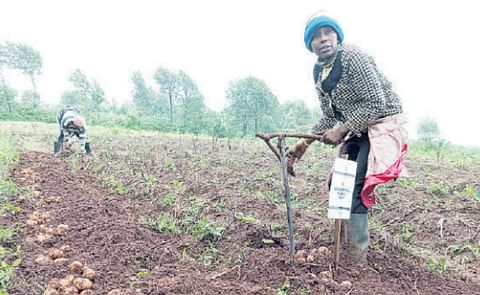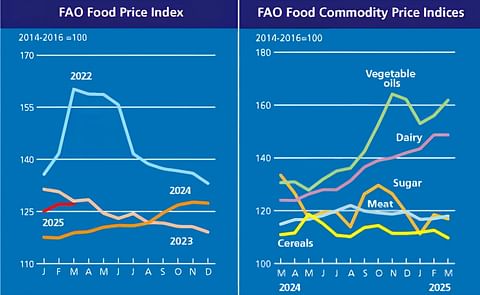New potatoes are often found at roadside stands like this one at G.W. & R. Visser Farms in Orwell, P.E.I. (Courtesy: Caroyln Ryan | CBC)
7 things to know about P.E.I.'s 'new' potatoes

New potatoes are a veggie lover's early-summer dream — the tender little spuds, some around the size of golf balls, others the size of a crabapple, melt in your mouth when steamed, buttered and lightly seasoned. Heaven. And they're now popping up at roadside stands across P.E.I.
But what exactly are new potatoes?
How are they grown and harvested, and when are they no longer 'new'?
1. They are not one special breed
New potatoes are planted in spring, as soon as fields are dry enough — sometimes in early April — and so can be a number of different early varieties (that's potato lingo for breed or type).

So-called 'new' potatoes are carefully dug while their tops are still green, so their skins haven't had a chance to toughen. (Courtesy: G.W. & R. Visser Farms)
Mark Phillips from the P.E.I. Potato Board via email:
“Common early-season varieties on P.E.I. include Irish cobbler (an old-time favorite), eramosa (a creamy tasting potato), superior (a standard commercial early) and Jemseg (usually the first one ready). Often these early potatoes are marketed by variety name and many people have their favourite.”
Early varieties mature quickly — after about 60 to 70 days in the ground. On the other end of the spectrum, russet Burbank potatoes used in french fry processing take 120 days to grow and are usually the last out of the ground in the fall. If one tried to harvest them now there wouldn't be much to see, Phillips said, because most of the plant's energy has gone into first growing its leafy top.
2. They are encouraged along
Phillips explained that the first step is 'green sprouting' the seed (which is itself a cut-up potato). Green sprouting is allowing the potatoes to sprout before they are put in the ground, to give them a head start.
Once planted, the rows or drills of potatoes may be covered with plastic to help warm up the soil and air underneath, and protect emerging plants from late frost, he said.
3. They are harvested early
New P.E.I. potatoes currently for sale have been harvested early, when the tops are still green and before the skins have a chance to thicken. (That thickening is natural process experts call suberization — it prepares the potato to be stored, sometimes for almost a year.
It begins when they are dug. The spuds are first kept at a moderate temperature of 8 to 10 C and at low humidity. Once they're suberized, they're ready to be stored at cooler temperatures. Now you know!)


Roadside stands selling early potatoes are popping up across P.E.I.
Jay admits the definition of a new potato is 'a little vague,' but he considers potatoes to be new if they are sold fresh after digging and have not been stored.
The earliest new potatoes are harvested after they've grown in P.E.I.'s rich red soil is roughly 70 days.
4. They are harvested mostly by hand
On the Visser farm, new potatoes are dug with a tractor and a one-row turnip harvester. Because the tiny spuds are so tender, they are picked by hand into crates, then bagged and weighed.

The next generation of farmers? Some of the Visser children pick new potatoes to be sold at roadside stands on P.E.I. (Courtesy: G.W. & R. Visser Farms)
The potatoes are not washed — they are already high in moisture, and dampness might cause them to break down, especially in the warm sun of a roadside stand.
Because the process is labour intensive, Visser's farm plants only a small amount of new potatoes — about a hectare.
5. Why are they so delicious?
Because the little spuds are so high in moisture they are tender, have a creamy texture and are ready to soak up butter, Jay said.

New potatoes
Mark Phillips with the P.E.I. Potato Board:
“New potatoes make up a very small percentage of our total sales, but they are a very important part of the true P.E.I. experience in the summer.”
“New potatoes are great on the barbecue, in a salad, or simply boiled with some butter, salt and pepper.”
While they may be creamy, they are not what are called creamer potatoes, however. Creamers look like new potatoes in that they are tiny and have a creamy texture. Creamers are planted specifically to be sold year-round as tiny potatoes, or what is sometimes called 'baby' potatoes.
Jay explains they are planted densely and their growth is stopped mid-stage by top-killing when they are all roughly the size of golf balls. Creamer potatoes do suberize — their skins set or stiffen slightly — before they are stored. The Little Potato Company, which contracts some farmers in P.E.I. to grow tiny spuds, even have their own proprietary breeds of creamers.
6. When are they no longer considered 'new'?
That may depend on who you talk to.
Jay said Visser's maintains the 'new' label as long as the potatoes are sold fresh, before being stored.
Adam Jay, Chief operating officer:
“It aligns well with the tourist season.”
“We potentially keep our new potato stands till mid-September.”
People like grabbing a bag on their way to the cottage or as a tasty souvenir of their trip as they head for the ferry or the bridge, he said.
7. How important is the sale of new potatoes?
Purely economically, new potato sales are, well, small potatoes.

The new potatoes must be harvested by hand. (Courtesy: G. W. & R. Visser Farms)
Visser's sells at some small convenience stores and a handful of roadside stands. Their main business is growing and selling potatoes for the table, and for seed.
'For us, it's probably more for the fun of seeing something growing early in the season,' as well as satisfying local demand for the tasty treats, said Jay, adding Visser's hires local youth for the harvesting, some who are involved in 4-H, so they can 'experience the joy of seeing things grow,' and make some extra pocket money.
With COVID-19 restricting visitors to P.E.I. to seasonal residents and tourists from the other Atlantic provinces, Jay said farmers 'will take a hit on tourist sales this year.'
'New potatoes make up a very small percentage of our total sales, but they are a very important part of the true P.E.I. experience in the summer,' enthused Phillips.
'They are great for tourists visiting the Island, and they fill an important gap between when the previous year's crop is cleaning up, and when we begin harvesting our storage crop in the fall. They are certainly a fan favourite.'











